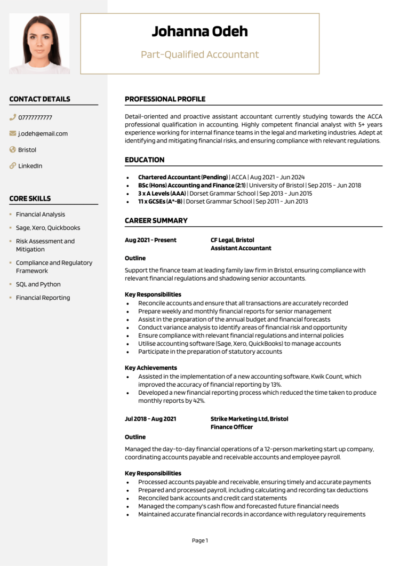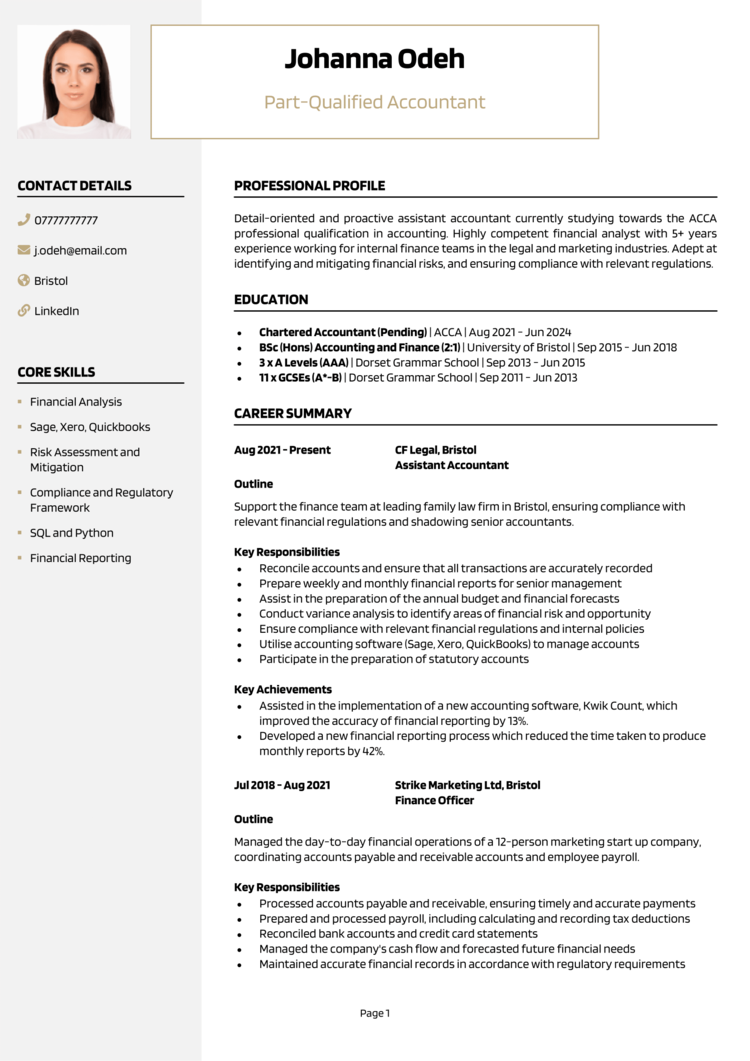Are you looking to get started in your first accounting position while you continue your studies? Then you need an up-to-date CV that showcases your qualifications.
If you’re not sure how to effectively highlight your growing skill set, we can help.
We’ve got the formula for a strong application. Check out our step-by-step guide and part qualified accountant CV example below.
|
Part Qualified Accountant CV example
Use this CV example as a guide to formatting and structuring your Part Qualified Accountant CV, so that busy recruiters can easily digest your information and determine your suitability for the role.
It also provides some insight into the key skills, experience and qualifications you need to highlight.


Part Qualified Accountant CV layout and format
Think your CV is just about the content within it? Think again.
Your CV needs to look professional and be easy for recruiters to read, meaning the structure and format of your CV are just as important as the written content within it.
Facilitate ease of reading by using a simple structure which allows anybody to easily navigate your experience.
Tips for formatting your Part Qualified Accountant CV
- Length: If you want to hold the reader’s attention and ensure your CV isn’t yawn-worthy, it’s best to stick to two sides of A4 or less. This is more than enough room to highlight why you’re a good match for the role – anything more can quickly become tedious!
- Readability: Recruiters appreciate CVs that they can quickly scan through without trouble. Ensure yours makes the cut by formatting your headings for attention (bold or coloured fonts should do the trick) and breaking up long paragraphs into smaller chunks or short, snappy bullet points.
- Design: When it comes to CV design, it’s best to keep things simple and sleek. While elaborate designs certainly command attention, it’s not always for the right reasons! Readability is key, so whatever you choose to do, make sure you prioritise readability above everything.
- Photos: Headshot photos aren’t required in a CV by most employers, but some creative and artistic industries like to see them. If you decide to include one, make sure you look smart and professional in the picture.
Quick tip: Creating a professional CV style can be difficult and time-consuming when using Microsoft Word or Google Docs. To create a winning CV quickly, try our quick-and-easy CV Builder and use one of their eye-catching professional CV templates.
CV structure
As you write your CV, work to the simple but effective structure below:
- Name and contact details – Pop them at the top of your CV, so it’s easy for recruiters to contact you.
- CV profile – Write a snappy overview of what makes you a good fit for the role; discussing your key experience, skills and accomplishments.
- Core skills section – Add a short but snappy list of your relevant skills and knowledge.
- Work experience – A list of your relevant work experience, starting with your current role.
- Education – A summary of your relevant qualifications and professional/vocational training.
- Hobbies and interests – An optional sections, which you could use to write a short description of any relevant hobbies or interests.
Now you understand the basic layout of a CV, here’s what you should include in each section of yours.
Contact Details
Start off your CV with a basic list of your contact details.
Here’s what you should include:
- Mobile number
- Email address – It’s often helpful to make a new email address, specifically for your job applications.
- Location – Share your town or city; there’s no need for a full address.
- LinkedIn profile or portfolio URL – Make sure the information on them is coherent with your CV, and that they’re up-to-date
Quick tip: Delete excessive details, such as your date of birth or marital status. Recruiters don’t need to know this much about you, so it’s best to save the space for your other CV sections.
Part Qualified Accountant CV Profile
Your CV profile is basically a short introductory paragraph, which summarises your key selling points and highlights why you’d make a good hire.
So, write a well-rounded summary of what you do, what your key skills are, and what relevant experience you have.
It needs to be short, snappy and punchy and, ultimately, entice the reader to read the rest of your CV.
CV profile writing tips:
- Make it short and sharp: It might be tempting to submit a page-long CV profile, but recruiters won’t have the time to read it. To ensure every word gets read, it’s best to include high-level information only; sticking to a length of 3-5 lines.
- Tailor it: The biggest CV mistake? A generic, mass-produced document which is sent out to tens of employers. If you want to land an interview, you need to tailor your CV profile (and your application as a whole) to the specific roles you’re applying for. So, before you start writing, remember to read over those job descriptions and make a list of the skills, knowledge and experience the employers are looking for.
- Don’t add an objective: If you want to discuss your career objectives, save them for your cover letter, rather than wasting valuable CV profile space.
- Avoid generic phrases: Clichés like “blue-sky thinker with a go-getter attitude” might sound impressive to you, but they don’t actually tell the recruiter much about you. Concentrate on highlighting hard facts and skills, as recruiters are more likely to take these on board.
Example CV profile for Part Qualified Accountant
What to include in your Part Qualified Accountant CV profile?
- Experience overview: Demonstrate your suitability for your target jobs by giving a high level summary of your previous work work experience, including the industries you have worked in, types of employer, and the type of roles you have previous experience of.
- Targeted skills: Ensure that your profile highlights your key skills that are most relevant to your Part Qualified Accountant, and tailor them to match the specific job you are applying for. To do this, refer to the job description to closely align your skills with their requirements.
- Key qualifications: If the job postings require specific qualifications, it is essential to incorporate them in your profile to ensure visibility to hiring managers.
Quick tip: If you are finding it difficult to write an attention-grabbing CV profile, choose from hundreds of pre-written profiles across all industries, and add one to your CV with one click in our quick-and-easy CV Builder. All profiles are written by recruitment experts and easily tailored to suit your unique skillset.
Core skills section
Underneath your profile, write a core skills section to make your most relevant skills jump off the page at readers.
It should be made up of 2-3 columns of bullet points of your relevant skills.
Before you do this, look over the job description and make a list of any specific skills, specialisms or knowledge required.
Then, make sure to use your findings in your list. This will paint you as the perfect match for the role.
Important skills for your Part Qualified Accountant CV
Accounting Principles – Maintaining a strong understanding of accounting principles and concepts, including double-entry bookkeeping, financial statements, and cost accounting.
Financial Analysis – Analysing financial data, including financial statements and reports, to identify trends and variances and help the organisation make informed decisions.
Taxation – Maintaining a working knowledge of tax regulations, including VAT and corporation tax, and preparing and filing tax returns accurately and on time.
Budgeting and Forecasting – Preparing budgets and forecasts based on financial data, trends and forecasts to help their organisation plan and make informed decisions.
Data Management – Managing financial data accurately and securely, including data entry, data analysis, and database management.
Accounting Software – Utilising accounting software, such as QuickBooks or Sage, to manage financial data and generate reports.
Financial Reporting – Preparing financial reports and statements accurately and on time, in accordance with accounting standards and regulations.
Stakeholder Communication – Utilising excellent communication skills, both written and verbal, to effectively communicate financial information to colleagues, managers, and clients.
Quick tip: Our quick-and-easy CV Builder has thousands of in-demand skills for all industries and professions, that can be added to your CV in seconds – This will save you time and ensure you get noticed by recruiters.


Work experience section
Now that recruiters have a good overview of your skills and abilities, you need to jump into the detail of your career history.
Give them a more thorough insight into what you can do by creating a detailed list of your relevant experience.
Start with your current role, and work backwards through all the relevant positions you’ve held.
This could be freelance, contract or voluntary work too; as long as it’s related to the role you’re applying for.
Structuring each job
If you don’t pay attention to the structure of your career history section, it could quickly become bulky and overwhelming.
Get in recruiters’ good books by creating a pleasant reading experience, using the 3-step structure below:
Outline
Provide a brief overview of the job as a whole, such as what the overriding purpose of your job was and what type of company you worked for.
Key responsibilities
Using easy-to-read bullet points, note down your day-to-day responsibilities in the role.
Make sure to showcase how you used your hard sector skills and knowledge.
Key achievements
Round up each role by listing 1-3 key achievements, accomplishments or results.
Wherever possible, quantify them using hard facts and figures, as this really helps to prove your value.
Sample job description for Part Qualified Accountant CV
Outline
Support the finance team at leading family law firm in Bristol, ensuring compliance with relevant financial regulations and shadowing senior accountants.
Key Responsibilities
- Reconcile accounts and ensure that all transactions are accurately recorded
- Prepare weekly and monthly financial reports for senior management
- Assist in the preparation of the annual budget and financial forecasts
- Conduct variance analysis to identify areas of financial risk and opportunity
Quick tip: Create impressive job descriptions easily in our quick-and-easy CV Builder by adding pre-written job phrases for every industry and career stage.
Education and qualifications
At the bottom of your CV is your full education section. You can list your formal academic qualifications, such as:
- Degree
- GCSE’s
- A levels
As well as any specific Part Qualified Accountant qualifications that are essential to the jobs you are applying for. Note down the name of the qualification, the organisation at which you studied, and the date of completion.
Hobbies and interests
The hobbies and interests CV section isn’t mandatory, so don’t worry if you’re out of room by this point.
However, if you have an interesting hobby, or an interest that could make you seem more suitable for the role, then certainly think about adding.
Be careful what you include though… Only consider hobbies that exhibit skills that are required for roles as a Part Qualified Accountant, or transferable workplace skills.
There is never any need to tell employers that you like to watch TV and eat out.


A strong, compelling CV is essential to get noticed and land interviews with the best employers.
To ensure your CV stands out from the competition, make sure to tailor it to your target role and pack it with sector-specific skills and results.
Remember to triple-check for spelling and grammar errors before hitting send.
Good luck with the job search!










